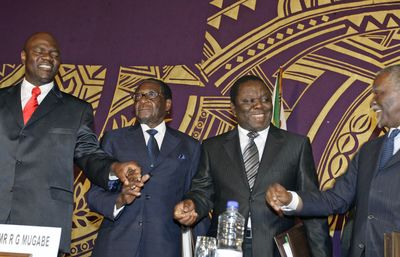Power-sharing deal signed in Zimbabwe

JOHANNESBURG, South Africa – President Robert Mugabe ceded a large share of control over Zimbabwe’s government Monday in a power-sharing agreement that loosened his absolute hold over a nation he helped lead to independence nearly three decades ago.
The deal, signed in Zimbabwe’s capital, Harare, in a ceremony that featured a glum Mugabe shaking the hands of his rivals, provided an opening that could bring a much-needed turnaround to a nation that has been in economic free fall for years and in political crisis since elections this spring. But its success depends on the cooperation of longtime enemies who must now work together in a unity government charged with lifting Zimbabwe out of ruin.
The pact envisions an even distribution of power between Mugabe’s party and opposition groups, but sources close to the negotiations have said Mugabe will retain control over the army, whose members used force in attempts to intimidate opposition supporters earlier this year. Opposition leader Morgan Tsvangirai will become prime minister and oversee a council of ministers that will supervise a 31-member Cabinet headed by Mugabe. The leader of a splinter opposition group will be deputy prime minister.
Tsvangirai, who was greeted by cheering supporters Monday, cited the nation’s “needless suffering” but called on Zimbabweans to look ahead. “We had two options: to put aside our differences or to continue to let the impasse plunge our country into the abyss of a failed state,” said Tsvangirai, 56.
Western powers have pledged to lift economic sanctions and provide aid only if true power is given to Tsvangirai. Diplomats from the United States, Britain and the European Union voiced caution Monday, saying they would need to examine the deal before making any pledges.
Jendayi E. Frazer, assistant U.S. secretary of state for African affairs, said in an interview that the United States wants to see “real change” in Zimbabwe. “We will have to reserve our final judgment until we are able to study the agreement and learn more about the new government,” Frazer said.
Zimbabwe, once an agricultural powerhouse and prime tourist destination, has in recent years descended into an economic morass that experts attribute to Mugabe’s disastrous policies, including the mass seizure and redistribution of white-owned commercial farms. The official inflation rate is now higher than 11 million percent, and many Zimbabweans are unemployed and barely able to feed themselves.